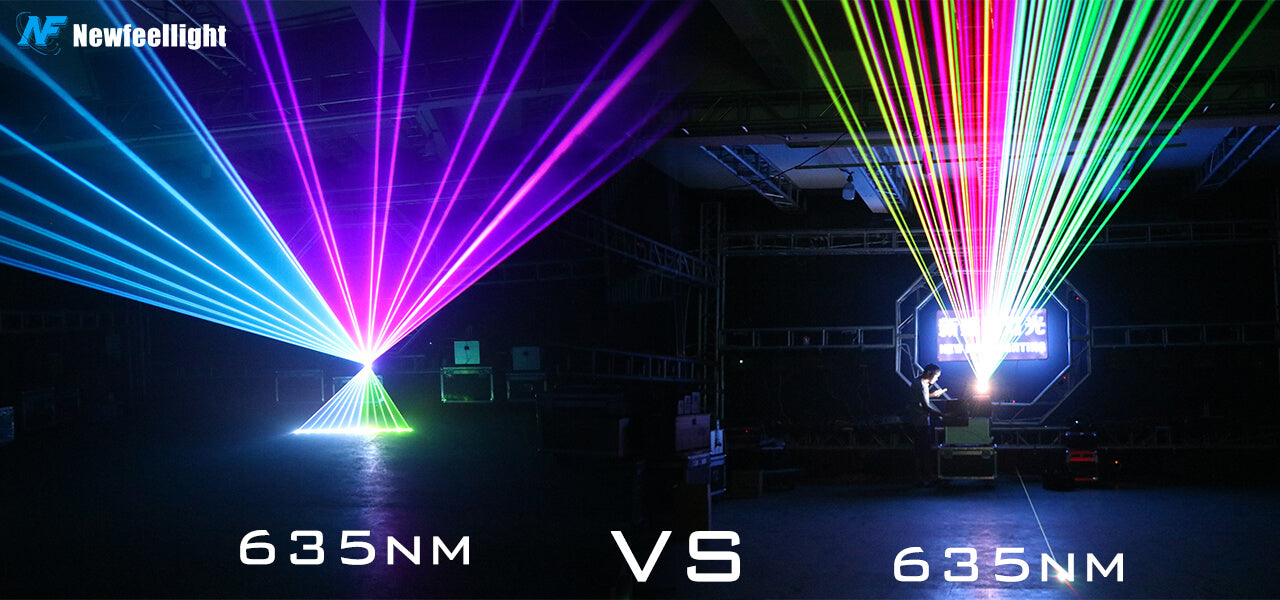Stage laser light color effect comparison
by Newfeel Ho on Aug 30, 2022
Stage laser light is a new type of equipment that is indispensable for stage
effects and increases the atmosphere of the scene.
Stage laser lights are usually divided into 3 basic different colors: Red
(red), Green (green), Blue (blue). Generally, when we choose stage laser
lights, the first thing we pay attention to is its brightness. Brightness is
directly related to the best display effect in the entire laser demonstration
process, and part of the key to highlighting the best laser effect depends on
how to correctly select the laser, which is quite critical.
1. The general stage
laser light
generally uses Red (red) 635nm red laser, Its characteristics are that it is
cheap, the beam divergence angle is large, the beam is poor and square, the
lifespan is average, and the range is short. Generally, it cannot achieve the
delicate and dazzling feeling we want, and its light spot is in the shape of a
square. If we have a short distance Watching, the effect is acceptable, once
it is used in a more demanding occasion, the problem will come.
Disadvantages: the beam is virtual, not smooth.
Second: no penetration (everyone knows that smoke is a constant factor for all stage lighting) Third: the lifespan is not very high, usually around 5,000 hours.
Disadvantages: the beam is virtual, not smooth.
Second: no penetration (everyone knows that smoke is a constant factor for all stage lighting) Third: the lifespan is not very high, usually around 5,000 hours.
2. The 650nm red laser is also commonly used in general laser lamps. Its price
is much cheaper than that of the 635nm laser. Compared with the 635nm laser,
its divergence angle is much smaller, but its wavelength characteristics
determine its range. It is very short, and the brightness and color will be
greatly reduced.
3. Comparing the brightness of 635nm laser and 650nm laser: 635nm/500mW laser
and 2000mw (2W) laser with brightness of 650nm have almost no difference in
actual brightness, and there is no obvious improvement and increase in
technology, mainly some The merchant is used to charge the power.
Let's take an example:
10W full-color laser light, if your configuration is: 650nm/5W, 532nm/2W, 447nm, 3W, the power is enough to 10W on the surface, and it is also 10W measured by the power meter. However, its brightness can only be equivalent to the brightness of a 5W full-color laser light, and the cost is actually close, so consumers should learn to distinguish the details of wavelengths, not just the power
Let's take an example:
10W full-color laser light, if your configuration is: 650nm/5W, 532nm/2W, 447nm, 3W, the power is enough to 10W on the surface, and it is also 10W measured by the power meter. However, its brightness can only be equivalent to the brightness of a 5W full-color laser light, and the cost is actually close, so consumers should learn to distinguish the details of wavelengths, not just the power

4.
NEWFEEL NF660
Red (red) 638nm is characterized by its small size, it can emit
pure white light, the beam divergence angle is small, the beam is oval, and the edge is
clear, the life is more than 2 times that of 635nm, and the divergence angle
is only 635nm. One-third, the energy is more concentrated than other
wavelengths of red lasers, so the range will be farther. It is the best choice
for high-quality stage laser lights, especially the animated laser effect it
presents, you will see particularly delicate and clear line shapes. It not
only solves the problems of large divergence angle, poor beam, and blurred
imaging of the 635nm laser, but also completely outperforms the above two
opponents in terms of range. This is the difference!

5. Contrast: After 20 meters, the difference between the general laser light
Red (red) 635nm and
NEWFEEL NF660
Red (red) 637nm, under the same power and the same distance (set to 10
meters), the 635nm laser The spot is about 3cm, and the diameter of the 637nm
laser is about 1cm. If you want to use these lasers in large-scale stage laser
performances or outdoor laser lights, you might as well use the trigonometry
to calculate it yourself, and the results will be beyond your imagination.





